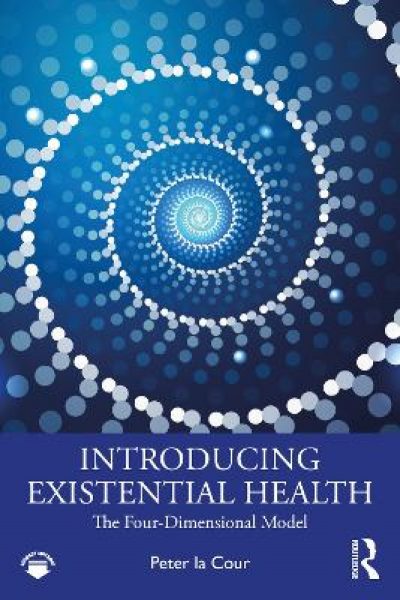
Author: Peter la Cour
In modern society, the concept of health has become increasingly skewed, with the biological dimension taking up most of the political energy, interest, power, and money. This is despite the fact that, as early as 1946, the WHO defined health broadly as biological, psychological, and social well-being, with well-being as the central term. Accordingly, health is also a resource for well-being.
The book has two main parts. The first part analyses modern understandings of health and suggests a four-dimensional model for a holistic understanding of health. In addition to the biological, psychological, and social dimensions, the fourth dimension—the existential—consists of the subjective side of health and illness: health and illness seen from the inside, as experienced by a conscious human being. It is striking that the WHO definition of health did not explicitly include the ill person as subject, because it is a basic fact that only the subject has the capacity to suffer and to feel well. When we talk about well-being, we presuppose a person who can act of their own volition—to stay in bed, see a doctor, take a pill or not. It is strange that the subject has been left behind. The person has often not been taken seriously, although the person is essential to every possible health action.
If health is a resource for life, it is a resource for life as a whole, not just parts of it. And life is certainly more than the body and its physical processes. Therefore, a genuine concept of good health is more than is commonly recognised: it is a concept of a good life. As humans, we should strive for a good life, not perfect health. A good life includes sufficient health to live as one wishes; it does not demand perfect health, which is best viewed as an abstraction—it does not exist.
The second part of the book focuses on expanding this new dimension of existential health and clarifying what the concept encompasses. Previous attempts to define existential health are reviewed, and a small investigation of associations with the term “existential health,” collected mainly from healthcare workers over a number of years, forms the basis for an attempt to create a “map of the territory.” The basis is a set of collected and grouped themes that people in the field have mentioned under existential health. These themes are then ordered from the most subjective and inward—and therefore not readily shareable—labelled Experiences of Living; to three categories of more manifest subjectivity, labelled Life Orientations, Existential Qualities, and Existential Expressions.
Existential health is considered to be a very pluralistic concept, similar to biological, psychological, and social health. A definition of existential health as the well-being and well-functioning of all existential components is as broad as the definitions of the other health dimensions.
One chapter describes some of the empirical work that has already been done on the relationship between existential components and other types of health, mainly physical health. In short, there is already much empirical evidence of intercausality: happiness is connected to longer lives, as well as meaning and purpose in life, locus of control, worldview, and even political orientation.
The book is mainly intended for healthcare workers and policymakers/administrators in the health sector. It is written in a straightforward manner that avoids being overly abstract, even though some of the topics lean towards classical philosophical questions. The book is also intended for students in all health-related disciplines who are interested in what health actually means.
The epilogue of the book reads:
“Health is a means, not an end. As suggested, the existential dimension can include, for example, thoughts of personal death, including the possibility of feeling ‘full of days’. In this way, personal death can be ‘death on time’ and be embraced—a sign of existential health in action. Death is not the enemy, but the natural and healthy end. Death is essential for life on Earth to continue; death has always been a necessity in evolution, an obligation of every creature; life would not have evolved were it not for death creating new possibilities.
So, in this short period between our birth and our death, we may reflect on what brought us here without our knowing, and on what kind of end is possible. Existential concerns can lead us to strive for a good life, which is not a life of perfect health, but a life of sufficient health to make life worth living…
…Here, my profession as a health psychologist has reached its limits and gladly hands over the topic to philosophers and theologians, dreamers, politicians, activists, artists, and all living people with the resources and abilities to discover what life can be all about.